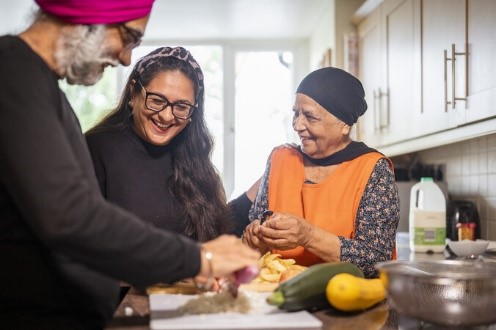August 22, 2025
From the Connect Project Team

Introduction
As the new Labour government rolled out policy directions for different aspects of the UK society, there was an increasing urgency for a dialogue about the well-being of different population groups and the role of the welfare state in an ageing society. People aged 65 and older constitute the fastest-growing population group in England in absolute and proportional terms[1]. More than one in four adults in this group lives with two or more long-term health conditions[2]. The chances of living in poverty in old age are predicted to rise from 17% (in 2022) to 23% (in 2040). A recent AgeUK report shows that an estimated 2 million older people have their care needs unmet. Our Nuffield Foundation-funded research project “Connecting Pensions, Health, and Care” explores a holistic approach to the three old-age support systems. We investigate both formal links between the systems and links which are formed because of the individual and family decisions at different stages of life (e.g. having or not having children and when to have them). In preparation for a survey and focus groups, we asked members to explore the feelings of the public about life in old age and the relevant systems during the bOing Festival at the University of Kent, England. This event, blending art and dialogue, brought together individuals across all ages to explore their experiences and views on ageing, welfare, and the future, while their little ones engaged in community art to relay their perspective about similar issues. This blog captures the key findings and testimonies from this event.
We asked, “What does it mean to you to live well in old age?” We began with this question because it’s a good way to get to know the different points of view and experiences that people have as they deal with the challenges of getting older. We wanted to understand how the concept of “living well” differs across people with different beliefs, cultural background, and life circumstances. Therefore, this question encouraged participants to reflect on their priorities, aspirations, and fears related to ageing
Meaning of Living Well in Old Age: Different Folks, Different Responses
We expected phrases like “be healthy” to dominate. While some participants expressed this as their perspective, Figure 1 presents a plethora of words that described the complexities of ageing in this context. Many of the participants expressed a desire for happiness, family, and community support, the dominant themes from their responses, suggesting that living well is not only about physical health but also mental, emotional, and social well-being. It indicates a desire to live a fulfilling and engaged life, even as one ages.
The most prominent theme was family and relationships, with a keen focus on not burdening their children while maintaining good family dynamics. This included a desire for close relationships with family members without imposing responsibilities or dependence. Such theme on community is also interesting because it emphasizes a growing openness toward building community outside of the family when ageing. This perspective fits well within the evolving social care landscape in the UK, where increasing reliance upon professional services is framed as compatible with maintaining independence without overburdening family members.
Figure 1: Top Words About the Meaning of Living Well in Old Age
We also observed some differences in perspectives depending on the gender or the lived experience of the participants. Male participants emphasised that they do not want to be a burden to their family when ageing. This sentiment was often linked to their refusal to accept offers of assistance from family or other caregivers, as they would prefer to manage their needs themselves. This observation spoke to the gender dimension in seeking assistance in old age.
Those with lived experience of caring for their parents were willing to continue to provide support knowing how much the increased family interaction and particularly time with young grandchildren, meant for their parents’ well-being. These are the inter-generational interactions that matter to living well in old age. Surprisingly, some considered that despite the cost of caregiving on the labour market outcome of family members, this cost is often not factored in the discussions about informal caregiving.
Overall, the feedback from our engagement underscored that “living well” is intertwined with social and family dynamics, emotional well-being, and the practical realities of care, which further emphasised the importance of balancing independence with the support needed to live well in old age.
Preparing for Old Age
To assess how prepared individuals are for the reality of ageing and what it entails, we asked respondents in a very obfuscated approach (knowing the sensitivity of the issue) when and how they started preparing for “living well in old age” and what they have done in that regard.
Some participants had taken proactive steps to secure a comfortable old age, for example, one noted that just doing things to keep well and healthy is a first step taken towards living well in old age. While some admitted they had not given much thought to it, others noted that they had not begun preparing for old age. Many expressed concerns about rising living costs, noting that these unpredictable changes make it challenging to plan. Yet, others felt unprepared because they had limited knowledge of the support available to the senior citizens.
Another sentiment expressed about preparation for “living well in old age” was related to family formation and living arrangement. For example, for some without a partner or children, long-term care was said to be a topic of significant concern, and some individuals had already begun setting plans in motion to manage their care independently. This is in terms of already having a plan of action to mitigate the risks in old age. Some others that focused on their living arrangement noted “year-round cruises” as an option of living well in old age rather than living in traditional care facilities. We have not got a chance to confirm whether it was a joke or a real intention.
These including observations suggest that there is a key policy need to support ageing preparedness in the UK through actions, which could include public education on long-term health, financial planning, and the need to embrace non-traditional options to secure living well in old age.
Systemic Challenges Towards Living Well in Old Age
We engaged in discussions about the challenges facing the UK ageing society and uncovered a complex web of issues affecting senior people. The challenges raised included a fragmented care system that impede timely service delivery. As noted in the conversations, the limited integration between the NHS, adult social care, and other services resulted in repeated requests for the same information by service users, which often led to inefficiencies and suboptimal care. Technically, this issue is called “interoperability,” which has emerged as a significant challenge in the UK’s health and social care system (Mistry et al., 2022).
Another challenge mentioned was the rising cost of living, which further imposed financial strain on senior people, many of whom struggle to manage essential expenses like housing and utilities. Again, participants expressed that this financial stress affects not only individuals but also the entire care system, making it difficult for both to plan effective care.
Moreover, participants mentioned that the working conditions of carers in the social care sector kept worsening over time. They observed that care workers frequently encountered inadequate remuneration, erratic scheduling, and insufficient reimbursement for personal expenses, such as travel, which might have led to elevated burnout and turnover rates. This situation adversely affected the quality and consistency of care provided to the ageing parents of the participants. Consequently, family members who assumed the roles of informal carers frequently experienced increased strain in providing care for their loved ones. These burdens included financial and time pressures, which are often unpaid or insufficiently compensated by the system.
Thousand Words of the Little Ones in Pictures
This section presents a catalogue of the drawings from the little ones on their perspectives about living well in old age. The artwork section was a form of engagement for the little ones, while their parents/guardians were having conversations with the research team during the BOING festival. They were given a tea mug or saucer and asked to think about their grandparent, using it to illustrate what living well means for them. We are using this blog to showcase their perspectives on this important issue through pictures, highlighting themes such as nature, faith, and the systems that support ageing.
Figure 3: Artworks During the Boing Festival
So, What Next?
This project will move these conversations further in the development of surveys, focus groups, and economic models, to understand how pensions, healthcare, and long-term care systems in England can sustainably work towards the wellbeing of the ageing population.
Reference
Mistry, P., Maguire, D., Chikwira, L., and Lindsay, T., (2022). Interoperability is more than technology The role of culture and leadership in joined-up care. The King’s Fund. Retrieved from Interoperability is more than technology: The role of culture and leadership in joined-up care
[1] See ONS statistics
[2] See Age UK report.


